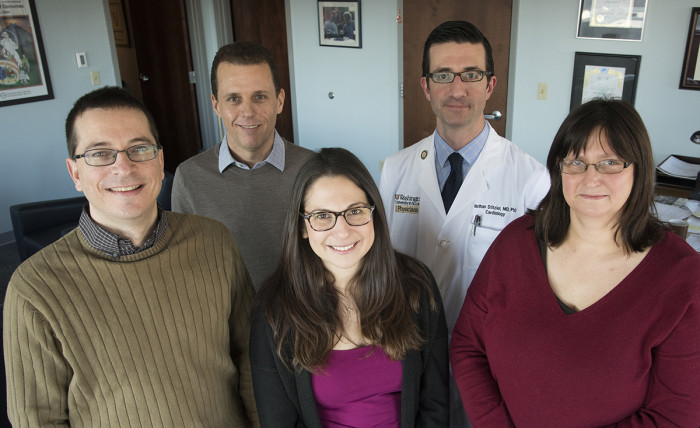$60 million to fund study of genetics underlying common diseases
Heart disease, diabetes, stroke, autism and epilepsy are focus of research supported by National Institutes of Health
 Eric Young
Eric YoungThe new funding will support sequencing the complete DNA — or genome — from each of 150,000 to 200,000 individuals, including a significant percentage of African Americans and others from diverse ethnic backgrounds.
The McDonnell Genome Institute at Washington University School of Medicine in St. Louis will receive $60 million from the National Institutes of Health (NIH) to study the genetics of common diseases, such as heart disease, diabetes, stroke, autism and epilepsy.
The goal of the research is to uncover how differences in DNA contribute to disease risk. The investigators anticipate finding variations in genes that may increase a person’s risk of developing a particular disease, as well as variations that may be protective in some way, reducing the risk of a particular disorder. Such information could lead to improved diagnosis and treatment options for patients.
The McDonnell Genome Institute at Washington University joins three other institutions in forming the Centers for Common Disease Genomics (CCDG) network, funded by the National Human Genome Research Institute (NHGRI), of the NIH. The partner institutions are the Broad Institute of MIT and Harvard, the Baylor College of Medicine and the New York Genome Center. Grants to all four institutions establishing the CCDG network total $240 million.
The new grants will support sequencing the complete DNA — or genome — from each of 150,000 to 200,000 individuals with these diseases. This includes a significant percentage of African-Americans and others from diverse ethnic backgrounds. Such large data sets are required to unravel the complex interplay between genetics and environment at work in cardiovascular disease, neurological disorders and autoimmune conditions.

“We’re excited to receive this award — it will allow us to perform detailed studies of common diseases with complex genetic origins,” said Richard K. Wilson, PhD, professor of medicine and director of The McDonnell Genome Institute. “This is the first systematic, large-scale effort to understand the genetics that underlie common diseases that are a significant burden to many families and a source of escalating health-care costs.”
Over the past 25 years, genome sequencing technology has advanced tremendously, making it possible for Washington University researchers and their colleagues to move from analyzing the relatively small genomes of simple organisms such as roundworms and yeast to helping produce the first full human genome sequence, which was completed in 2003.
“Washington University and the McDonnell Genome Institute have long histories of pioneering work in genetics and genomics,” said David H. Perlmutter, MD, executive vice chancellor for medical affairs and dean of the School of Medicine. “We are pleased to be joining other leading institutions to expand research that has the potential to advance personalized medicine. These new studies will allow us to probe deeply into the genetic basis of common diseases and provide the foundation for new diagnostic and therapeutic strategies.”
One initial focus of the new initiative at Washington University will be on understanding the genetics of cardiovascular disease. According to cardiologist Nathan O. Stitziel, MD, PhD, assistant professor of medicine and program co-investigator, the information could be useful for treating patients with coronary heart disease, which is the leading cause of death worldwide.
“The cardiovascular disease project within CCDG will be the largest, most comprehensive study of coronary disease genetics to date,” Stitziel said. “We will be able to interrogate the entire genome across tens of thousands of individuals with and without coronary disease, providing the opportunity to identify novel genes underlying the condition. This could provide new insights into the disease and identify novel therapeutic targets. We hope these findings will lead to the development of new drugs and better approaches to treating coronary disease.”
The new research builds on pioneering work at the McDonnell Genome Institute to unravel the genetics of cancer. In 2008, its scientists became the first to sequence the tumor of a cancer patient and compare it to that same patient’s normal tissue. Later studies demonstrated that differences between the tumor and normal sequences can identify mutations driving cancer growth.
That avenue of research has broadened to include many thousands of individuals and multiple tumor types, contributing to the recent shift in understanding that cancer should be treated based on the genes that have become mutated and dysfunctional, rather than on the particular part of the body that happens to be affected.
With the new grant, McDonnell Genome Institute investigators will expand beyond cancer to apply their expertise to common diseases with genetic origins that are more difficult to identify. These conditions are thought to result from the interaction of multiple genes, rather than the genetic errors that disable genes that lead to cancer.
“Unlike with cancer, for heart disease or diabetes, we can’t easily compare genomes from healthy and diseased tissue within the same person to find clues as to the cause of disease,” said Wilson, also the Alan A. and Edith L. Wolff Distinguished Professor of Medicine. “Instead, we have to sequence and compare genomes from many people with a particular disease and many people without that disease to find these clues. And because of natural variation within the human population, the number of genomes we need to sequence to accomplish this is pretty spectacular.”
Computational biologist Ira M. Hall, PhD, associate professor of medicine and associate director of the McDonnell Genome Institute, and his colleagues have developed new methods to analyze and interpret the massive quantities of data produced by sequencing billions of DNA “letters” from tens of thousands of patients.
“We have reached a point where the technology is good enough and the costs are low enough that we can sequence 20,000 patients with and without a disease, compare them and learn something meaningful,” Hall said. “Having the tools to analyze this data is as important as the sequencing technology itself.”
Wilson also explained that one of the goals of the program is to better understand how diverse ethnic ancestries may influence the risk of disease. In the first two years, the McDonnell Genome Institute will sequence thousands of genomes from African-American and Northern-European individuals to study early-onset coronary heart disease and type 1 diabetes.
 Robert Boston
Robert Boston





